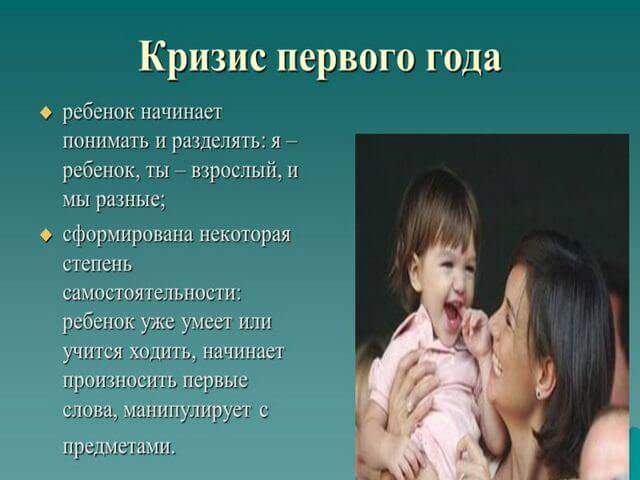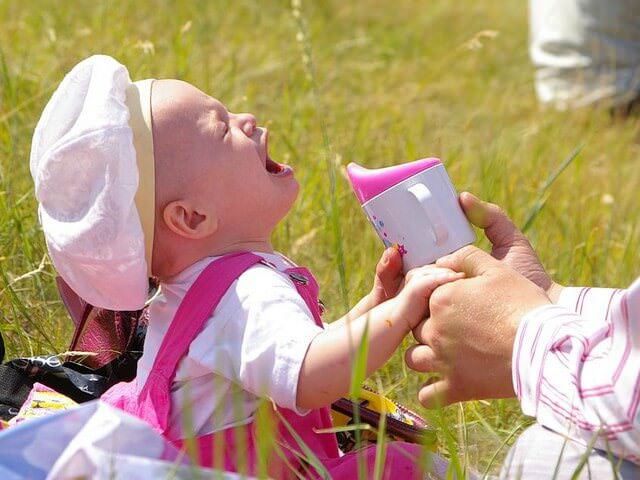When does this happen?
According to the child development calendar, all children experience this phenomenon between approximately 9 and 18 months. And this is not surprising.
A crisis always accompanies a person’s ascent to a new level of independence. That is why children experience crises at one year, three, seven years, and the transition period, which lasts from 12 to 14 years.
At the age of about a year, the baby moves into a vertical position and begins to move no longer in a stroller or crawling, but in the same way as adults. He is interested in trying out his teeth and touching everything with his hands in this new world for him.
And now he is already making a scandal about any reason - he defends his gastronomic tastes, rejects new clothes, putting mom and dad at a dead end at every step. But this is just the beginning!
Changes after the crisis of 1 year
- At the end of the crisis of one year, the baby is already confidently on his feet, he has mastered walking well.
- He learned to communicate with others using facial expressions, gestures and the first conscious sounds.
- If during the crisis of 1 year the little one was overprotected, then he may remain capricious. But in most cases, children become calmer and more balanced.
What is causing the crisis?
As we have already said, with the beginning of upright walking. This is where the parents’ misunderstanding of the child’s condition arises - after all, for adults this is common, but for the baby it is an amazing discovery. Words cannot describe how delighted this brings a child!
Take a closer look at the children on the street taking their first steps, how they glow with happiness! The expressions on their faces are completely different from the faces of preoccupied adults who are rushing about their business.
One-year-old children are already old enough to understand that something is changing in their lives at the moment, and changing for the better. It is this situation that contributes to the emergence of the first crisis.
But why now? The answer to this question is extremely simple. With the beginning of upright walking, the baby begins to feel independent from his mother. Just a couple of days ago he was afraid to be left alone even for a minute, but today he happily runs away from his mother, not paying attention to her calls.
Advice for mom and dad
After the birth of a baby, the laws in the family change. Everything revolves around the baby, mom and dad are forced to adapt to the daily routine of their beloved child. After just a few weeks of the toddler’s life, life begins to flow as usual. It would seem that everyone is happy and satisfied. But then a growth spurt comes and everything turns upside down.
You might be interested in: Top 20 ideas or what to give a newborn girl

The first thing parents should understand is that it’s not only hard for them during a crisis. The baby also suffers and cannot control his emotions. It is important for mom and dad to remain calm, to inspire their child with all their appearance that everything is fine. This will give the baby confidence and help him get through a difficult time.
Well, a very independent child!
Meanwhile, your rebellious baby has an internal conflict brewing. If earlier he peacefully endured everything that was done to him: he ate, what they gave, dressed, what they put on, but now everything has changed.
This independence begins to cause parents more and more inconvenience, because now it manifests itself in daily conflicts. It turns out to be a deadlock situation when the child can no longer be forced to do something with his order, and it is also not possible to come to an agreement yet, due to his lack of sufficient speech skills.
During this period, parents still have some kind of pill for whims - to switch the baby’s attention. This is easy to do, because the baby is still guided only by momentary desires. This feature of a one-year-old child is very actively used by adults to overcome problems associated with the crisis of the 1st year.
What parents shouldn't do
Many parents worry, not understanding how best to behave with a capricious baby. There is no need to worry - you just need to get through this difficult period, trying to make it as painless as possible for you and for the child. It is important to understand that everything that happens to him is normal. What you should not do:
- Blame yourself if the child cries or is naughty;
- Listen to relatives saying that you spoiled him;
- Yell at the baby, show him your negative reaction and spank him - he still won’t understand why;
- Scolding him for broken toys and painted walls is how he learns about the world;
- Ban him from everything. Remember that every prohibition is stress for a child, and all his disobedient behavior and throwing toys away is a way to learn about the world. In a dangerous situation, calmly explain to him why he should not do this;
- Use the word “cannot” too often. Save it for when your child actually does something wrong (like spilling sugar on the table). And in critical situations, use the word “dangerous”;
- To prevent your child from being independent - support him if he strives to do everything himself;
- Go to extremes, reacting to all his whims and fulfilling all his desires - look for ways to distract or persuade the child;
- Behave unworthily or incorrectly in the presence of a baby - children at this age copy everything;
- Showing your child that you are dominant because you are an adult should help him see you as his friend;
- Ignore the baby.
An important point: what not to do?
You should not demonstrate your superiority over the child: “We are adults, and only we know what needs to be done and how. And you will have to obey, whether you like it or not!”
Parents have no time to wage a permanent “war” with a little rebel: they are busy, always in a hurry somewhere, tired, they have neither the strength nor the desire to come up with something to constantly switch the baby’s attention. Meanwhile, such an authoritarian, directive style of education is very dangerous: after all, this crisis is the first, but not the last. It does not appear at certain stages of personality development by chance and is very important for the future life of an adult.
During periods of crisis, a child develops a line of independence and autonomy. If this line is “squeezed” too much, it can stay with a person for life. You don’t want your son, even at forty years old, to be unable to tear himself away from his mother’s skirt, and to be a dependent, apathetic person?
Risks of the crisis
The essence of the crisis is the separation of the child from the mother. Mom does not always understand the need and importance of this department. If a child’s need for independence remains unsatisfied, he immediately reacts with protest and dissatisfaction under pressure from adults and disrespect for his desires.
If the mother regularly ignores the child’s wishes, limits her independence, “knows better what the child needs,” then the baby’s negative reactions will not take long to arrive:
- cry of protest;
- violent motor reactions (swinging arms, moving the head from side to side);
- grievances and tears;
- demonstrative puffing of cheeks, etc.
The child still needs an adult, but the communication style must now be different. An adult must facilitate the separation of the child, no matter how difficult it is for the mother herself (not everyone is ready to acknowledge the maturation of children, especially at such an early age).
So what should you do?
You must not give in to emotions, but develop a clear strategy for your behavior, which can be expressed in the phrase: “be there, but never impose on the child.” Emotionally, with your warmth and care, let the baby know that you will come to his aid at the first call.
If suddenly your overly independent child gets lost “in three pines,” you should be right there. Do not allow situations where your baby loses you and rolls around in hysterics, unable to cope with nervous overstrain. Don’t even think about “punishing” him for disobedience in this way!
But it’s also not good to pretend to be a mother hen who doesn’t let you take a step. Neither excessive care nor detachment will help the correct formation of individual autonomy. Whether your child will grow into a self-sufficient and self-confident person, capable of making decisions and deciding his own destiny, largely depends on the tactics of behavior you choose.
Crisis of three years in a child
This will require a lot of patience and calm. This crisis is accompanied not only by hysterics, but also by constant arguments and stubbornness. The kid is ready to fiercely defend his desires. The parents' demands are fulfilled on the contrary; a lot of “no” and “I don’t want” appear in the vocabulary.
What to do?
You cannot indulge the child’s demands, but you also cannot break them. During a tantrum, the best way to cope is to calmly say, “We'll talk when you calm down,” and stop reacting to the child. A conversation after a tantrum must definitely take place (in general, always give your child only those promises that you will actually fulfill). Explain that tantrums are a completely ineffective way to get your way.
At three years old, children love to deny. Therefore, all questions and instructions should create the illusion of choice. If you say: “Now you will eat porridge,” expect a cry: “I don’t want porridge!” You should ask: “Will you have porridge with raisins or jam?”
Form positive behavior patterns in your child. Praise him for his independence, share his successes with his relatives in front of him.
What else can you offer your baby?
Of course, a creative approach, your own sense of humor and the ability to play and have fun. With such magical qualities, you can immediately solve any problem by turning it into a game. Baby doesn't want to wear a shirt? Play “shop” with him and offer to buy one of the shirts laid out in a row in front of him.
Having the right to choose is very important, and your little one will definitely appreciate this trust.
Doesn't want to put on a diaper or apron? Wear something similar to a stuffed bunny and let it set an example for your baby. Educational games can also help a lot. Pyramids, nesting dolls, construction sets - all this will provide an outlet for ebullient energy and help redirect the baby’s attention.
Only by acting together with the child, but not instead of him, can you very quickly overcome the crisis of the first year of life, at the same time laying a reliable foundation for harmonious development and a wonderful, trusting relationship with the child in the future.
How to behave to close adults
In order to survive the crisis of the first year of a child’s life with little loss, you need to build a common line of behavior for all family members. It is important that all adults with whom the baby comes into contact adhere to the same principles, so it will be easier for the baby to accept the right guidelines, learn correct interaction, and understand boundaries. Modern psychology adheres to a rather soft, but at the same time clear model for constructing communication with the god.
- Instead of restrictions, there are opportunities. A large number of prohibitions is a serious test for the baby and family, who are forced to repeat “no” all day long and remove/remove/leave/distract the young researcher. Creating a safe environment will help solve this problem. Place valuable, fragile, and dangerous items out of the reach of children. Fill the lower cabinets with things that can be taken out, thrown around, chewed on, or thrown. A kitchen drawer filled with towels, plastic utensils, sealed bags of cereal, pasta, and beans will give you 5 to 30 minutes of time. An extra half hour to an hour of morning sleep for mom is the bedroom, where there are boxes with toys, a container with all kinds of wires, a ball, there are doors that you can open and throw out your own clothes. Each child has his own preferences. Perhaps your child likes household appliances - ask your friends for a broken toaster, mixer, or unnecessary kettle, and give it to your child to be torn to pieces.

For every “you can’t”, try to find an alternative “you can”. It is forbidden to knock on the glass; it is better to knock on your chair. We don't tear books, take plain paper. Throwing a heavy toy is dangerous, here's a ball for you.
- Do it yourself. Allow them to show independence, support initiative, be there for backup. The baby wants to climb onto the sofa - place a high pillow on the floor, which will act as a step. If he wants to eat with a spoon, put him in a high chair, undressed, and give him some food that can be easily washed off surfaces.
- You won't be forced to get full. One of the most popular problems voiced by mothers is “he doesn’t eat anything!” Children of crisis age may refuse to eat out of a feeling of confrontation. Force-feeding a resisting child is every parent's worst nightmare; most often it ends with three spoons of mashed potatoes and general cleaning of the kitchen. Try changing tactics - invite your son/daughter to sit down and eat with you, the same food that you eat yourself. Of course, such an experiment presupposes proper nutrition for the whole family - high-quality products, a minimum of spices, gentle cooking methods. Don’t forget to remove unhealthy snacks like cookies and place them within the toddler’s visibility range after the main meal.

- Listen and hear. It is difficult to understand children who cannot speak; sometimes you have to guess for a long time what they want. Pay attention to the gestures and sounds of your little fidget, over time you will accurately determine his desires.
Help other relatives decipher children's requests, tell them what this or that sound or gesture means. The baby will be more willing to communicate with those who understand him.
- The value of communication. Talk - voice your actions, name objects, feelings (yours and your child’s), read. The development of a child’s speech is facilitated by the competent, clear speech of adults.
- Not the mother for the child, but the child with the mother. Despite the importance of playing together, a parent cannot devote all his time to this alone. Adults have work, household chores, and hobbies. When a baby sees its parents going about their daily lives, it develops. The natural course of family affairs reinforces the child’s behavior patterns, concepts of social roles, and teaches inclusion and independence. Involve your son or daughter in your daily routine, kids love it.

Today, psychologists talk about the need for about three hours of independent play or creativity for preschoolers during the day. There is no need to entertain the children around the clock; let them be alone, come up with some kind of activity of their own, even just hang around the apartment. For a year old, this might be picking at a box of pasta or 10 minutes of selfless banging on a stool with a spoon.
- A sea of tears. In developmental psychology, a faithful companion to a child’s 1-year-old crisis is crying. Children can cry for a long time, loudly, for any reason. With the help of tears, the little ones try to break the will of adults and demand what they want. Is it worth making concessions so that the child does not cry? No, if we are talking about clearly defined prohibitions that are of fundamental importance. The child must understand that the parent’s word is final, firm and unshakable. Through restrictions, the little pioneer gets acquainted with the concept of boundaries, and also gains confidence in the stability of the world around him, its reliability, consistency, which is very important for the harmonious development of the individual. You can and should feel sorry for a crying child, caress him, accept and name the emotions he is experiencing, and let him throw out his resentment, anger, and indignation through tears. A loving, understanding adult is better than blanket indulgence to avoid negative experiences. Speak words of encouragement, but be firm in your decisions: “I see that you are upset that you cannot take this doll with you outside, you really wanted to take a walk with it. Unfortunately, it will get dirty on the court, so we will leave it at home, take a truck or a ball, it’s possible.” The kid must understand that the head of the family is not he, but mom and dad, and they decide.










